
Category: Canadian Speaking Tour in the News


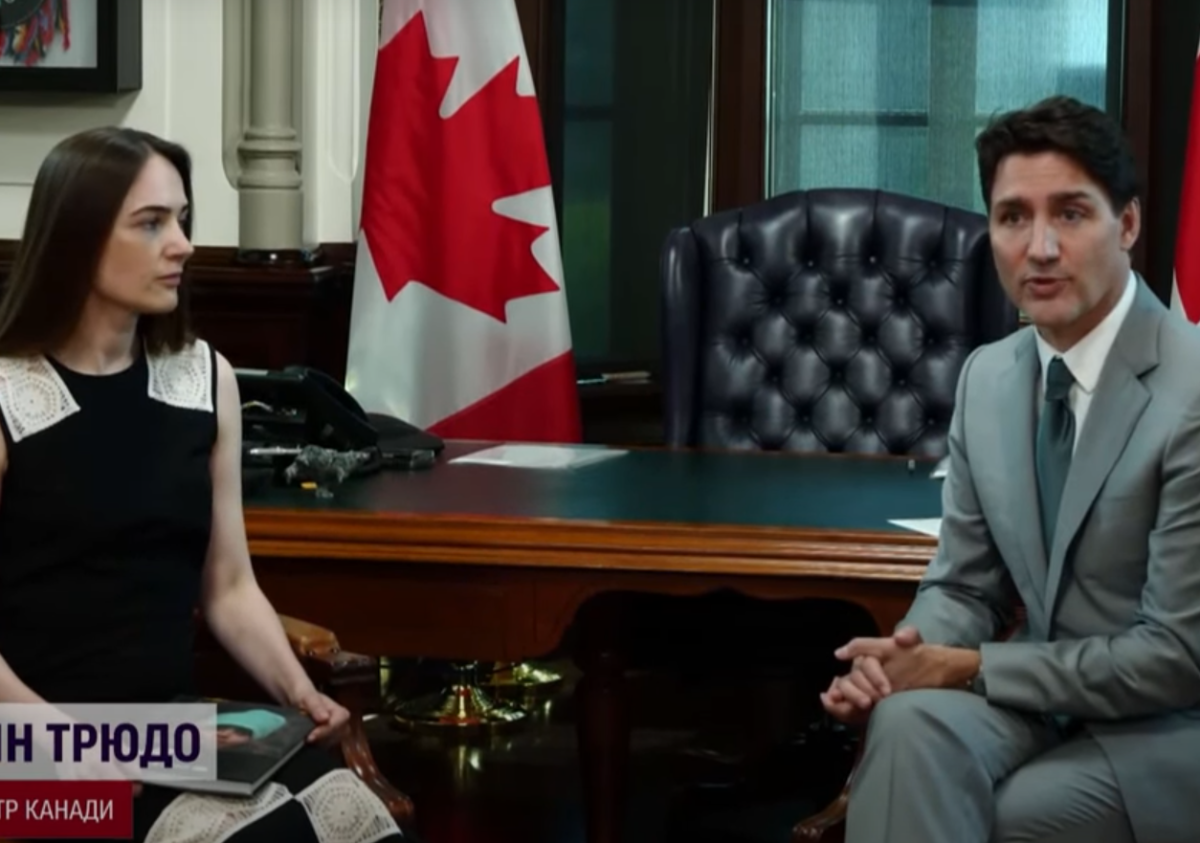


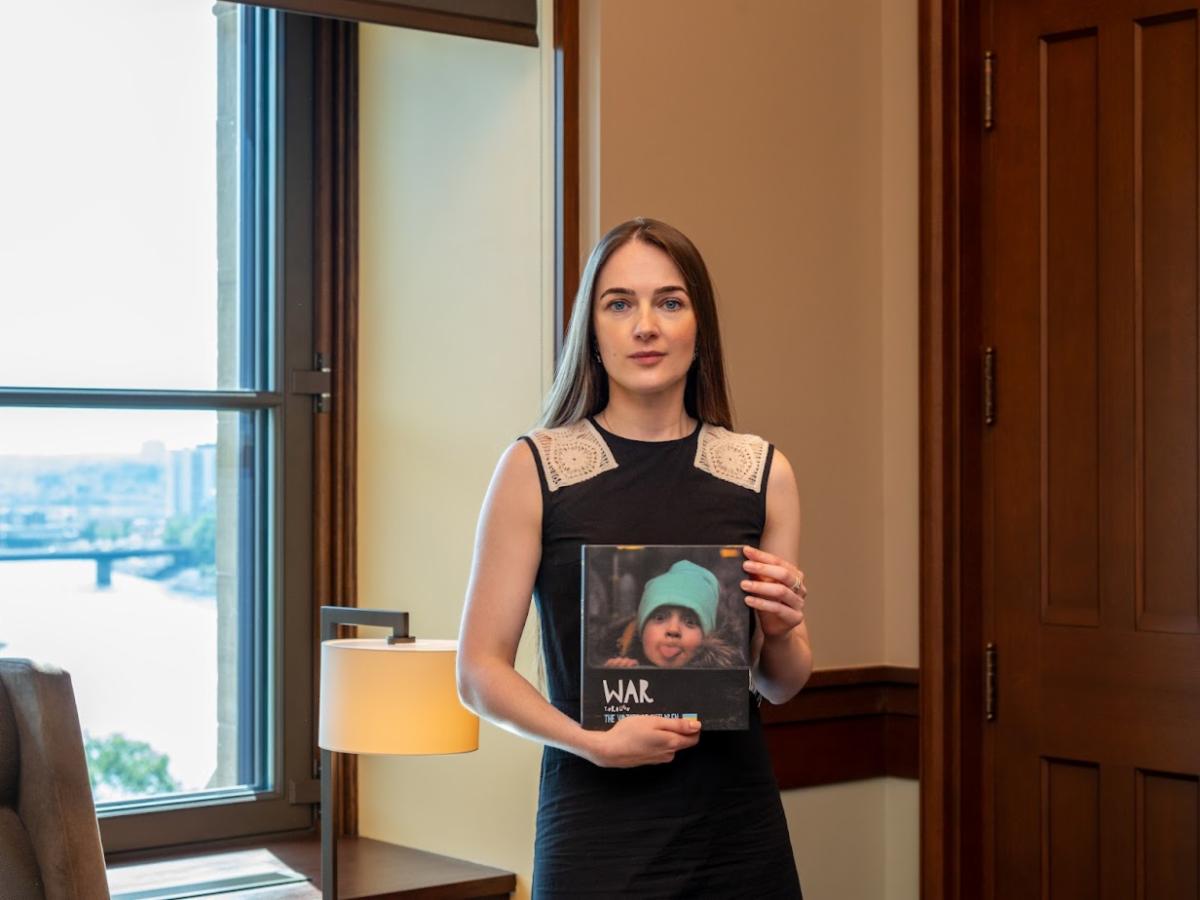
Through multiple events in four Canadian cities — Ottawa, Montreal, Toronto, and Winnipeg — Nobel Peace Prize recipient Oleksandra Matviichuk raised awareness of the plight of the thousands of Ukrainian children stolen by Russia, the impact of the war on women and children, and her ongoing work with the Centre for Civil Liberties Ukraine in cataloguing human rights abuses and war crimes, while raising funds for the civil society work of the Canada-Ukraine Foundation to aid in these areas.
Ms. Matviichuk discussed the ongoing human rights abuses perpetrated by Russia in Ukraine with Canada’s government officials and politicians, respected academics, think tank experts, and students ranging from elementary to university levels.
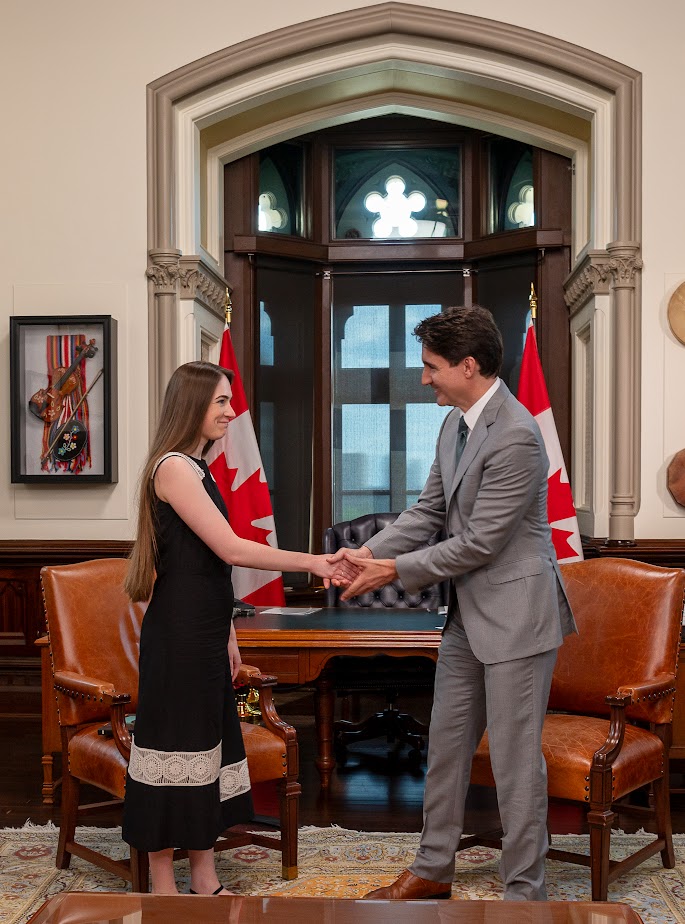
In Ottawa, on June 3rd, Oleksandra Matviichuk met with Canadian Prime Minister Justin Trudeau to talk about pressing needs in Ukraine – justice for war crimes, and the return of the 20,000 Ukrainian children stolen by Russia, and later testified before the Senate Committee on Human Rights. She was warmly received by the ambassadors of Sweden and Norway (the two Nobel prize sponsoring countries) and the ambassador of Ukraine, who jointly hosted a reception in her honour. Ms. Matviichuk also held a private lunch with women leaders, including Canadian human rights activists and major influencers within Canada’s political parties.
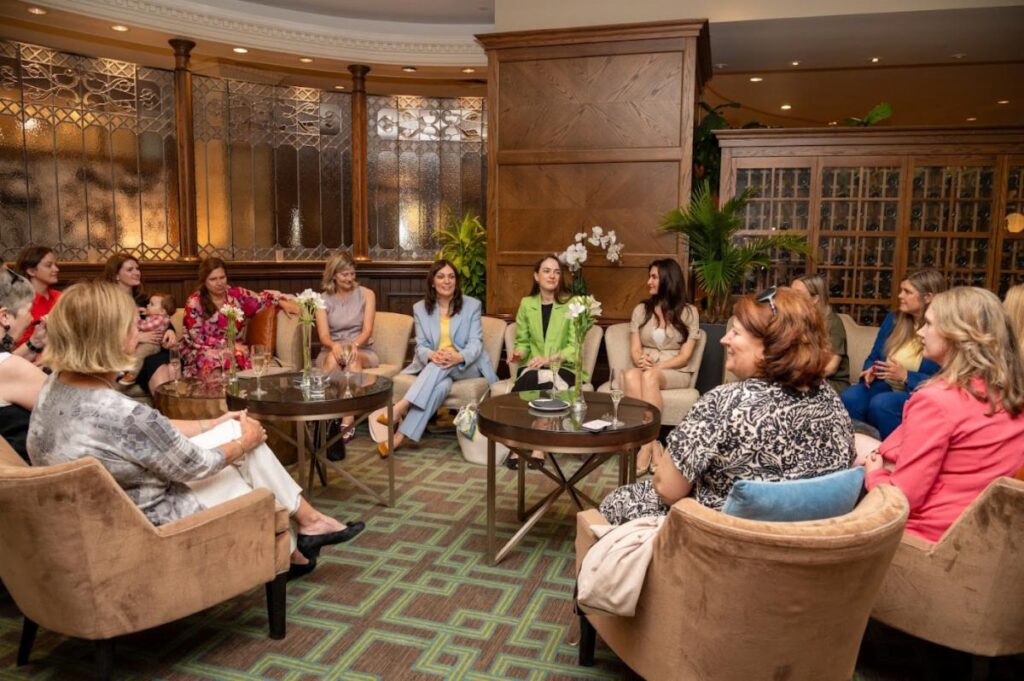
On Tuesday, June 4th, the Nobel laureate started the day meeting with MPs from the Canada-Ukraine Parliamentary Friendship Group where they discussed the need to strengthen legal frameworks for investigating Russian war crimes – and generally keeping Ukraine on the public radar. That was followed by a similar meeting with a group of senators – particularly those active in the foreign affairs, defence and human rights space. She held a thorough policy discussion with representatives from the Official Opposition on how best to support Ukraine.
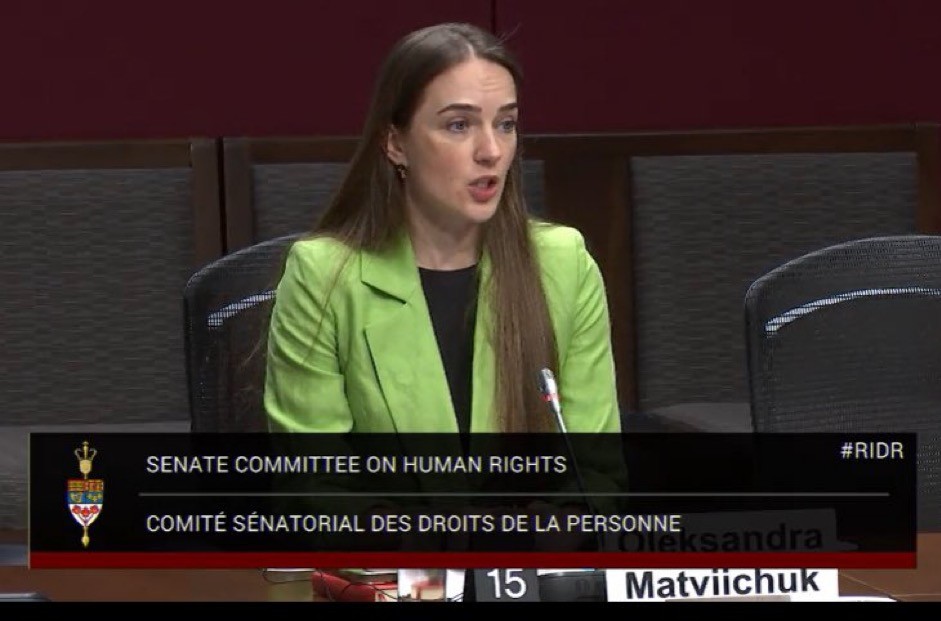
She then visited both chambers of Parliament – the Senate gallery and the House of Commons gallery – and was formally recognized by both Speakers, to applause from parliamentarians. After that came a courtesy call with the Speaker of the House, and a private tête-à-tête with Foreign Minister Melanie Joly to discuss the immense challenges of identifying and returning Ukraine’s 20,000 stolen children. They spoke about the upcoming Peace summit in Switzerland, and about facilitating exchanges so Canadian parliamentarians can see firsthand what is happening in Ukraine. Ms. Matviichuk then formally presented to the House of Commons Subcommittee on International Human Rights. Between events, she also managed to sneak in an impromptu brief bilateral with Canada’s Industry minister, which quickly turned into a tri-lateral when his Official Opposition critic joined in.
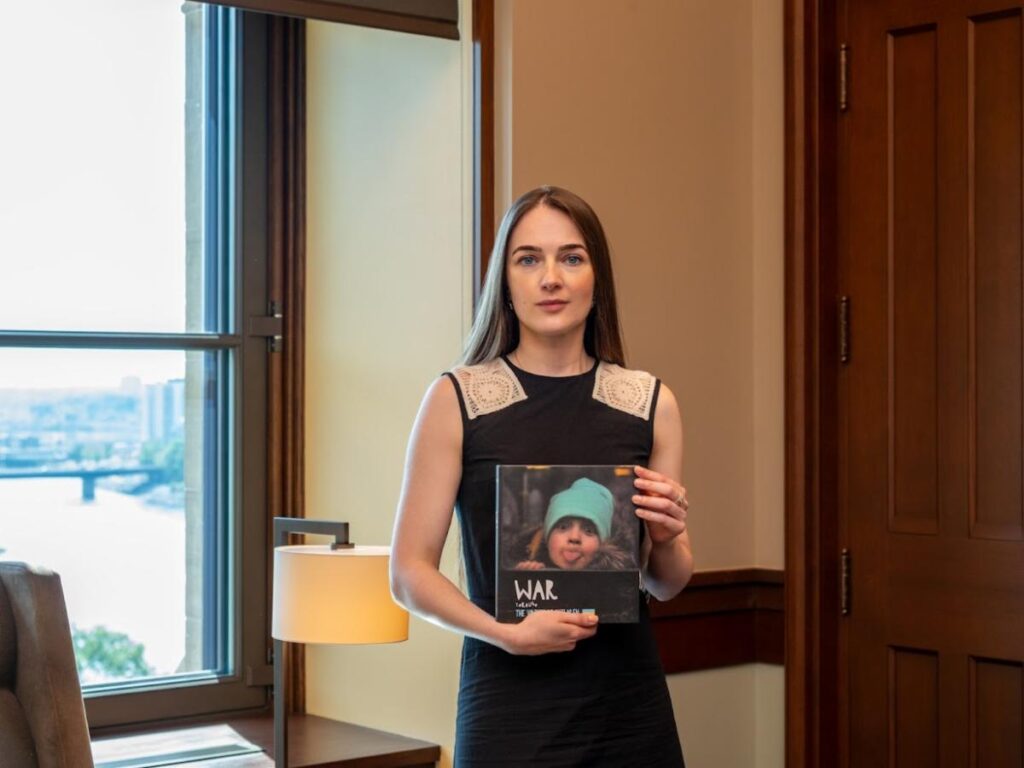
She ended the day with a fundraiser reception to raise resources for civil society work and the ongoing work of investigating war crimes.
Throughout the day on Tuesday, grassroots activists held a vigil outside the Parliament buildings with a “DeTy” exhibit – a double-entendre from the Russian word for “children” that was written on the Mariupol theatre that was obliterated in a Russian bomb raid. In Ukrainian, the same letters spell the words “where are you” – an apt coincidence highlighting the crisis of Ukraine’s missing children.
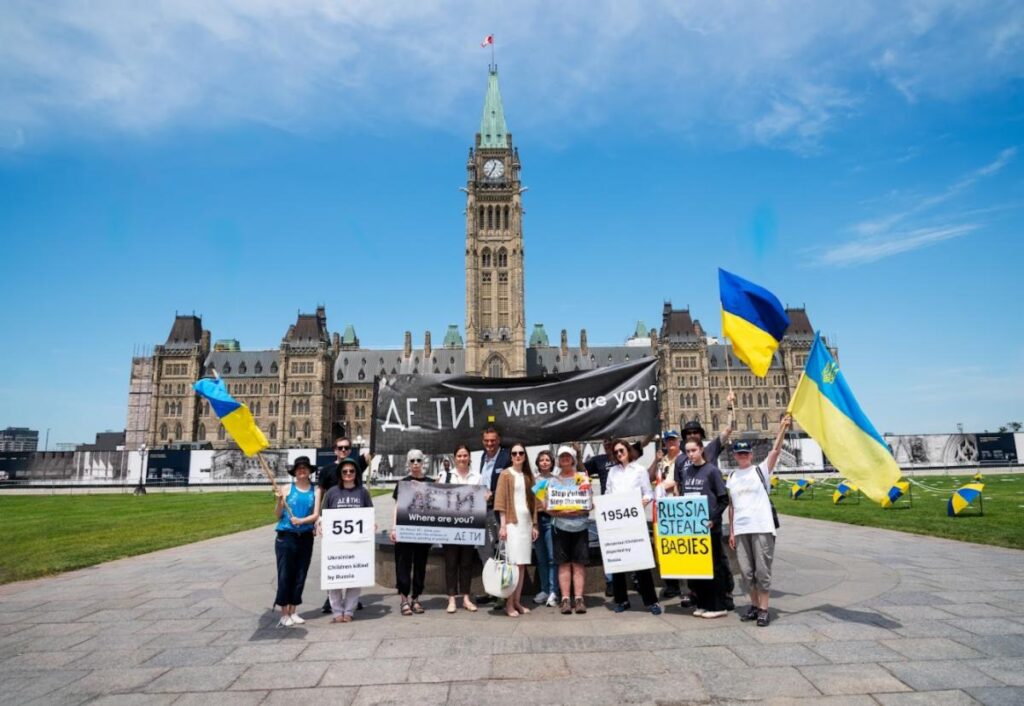
Wednesday, June 5th started with a meeting of the broader Ukraine team at the Department of Foreign Policy about Russian war crimes in Ukraine. Ms. Matviichuk then received a standing ovation by the Bloc Quebecois caucus – no strangers to the theme of cultural preservation – and held a frank meeting with the BQ leader about cultural and linguistic genocide. She then was the keynote at a luncheon event with Canadian Justice Minister Arif Virani, where they later shared the stage in a moderated Q&A on prosecuting war crimes, moderated by journalist extraordinaire Paul Wells. Minister Virani graciously presented her with a framed copy of the Canadian Charter of Rights and Freedoms written in Ukrainian.
Ms. Matviichuk then went to the offices of the Parliamentary Centre – an Ottawa-based democracy promotion NGO, where she met with the heads of numerous Canadian developments, human rights and democracy organizations. Following the round table, Oleksandra Matviichuk visited the Dominion Arboretum in Ottawa, where she ceremonially planted a white chestnut – the official tree of Kyiv – in memory of the children victims of war. Once she officially tagged the tree, it became an official part of the “Living Collection” of Canada’s national arboretum – a living monument under the stewardship of the Crown, for future generations.
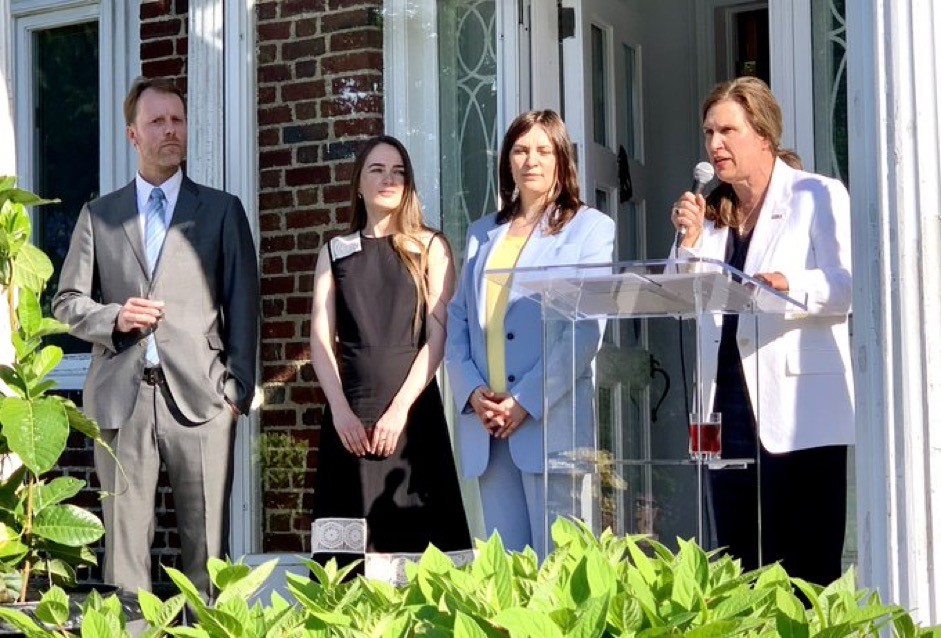
The day concluded with another diplomatic reception hosted by the ambassador of Denmark in celebration of their national day. Ambassador Hanne Fugl Eskjær introduced Oleksandra and formally thanked her for her work before the who’s-who of the diplomatic community in Ottawa. She was able to have a second, informal, discussion with Foreign Minister Joly before departing that night for Montreal.
On Thursday, June 6th, Ms. Matviichuk met with the staff of Equitas, a Montreal-based international human rights education organization of which she herself is an alumnus. She then went to the Old Port quarter of Montreal to deliver the inaugural John Lemieux Human Rights Leadership Lecture, organized by the Montreal Institute for Genocide and Human Rights Studies (MIGS) under Concordia University. Her keynote was followed by a journalist-moderated discussion with former ministers and Canadian human rights luminaries Irwin Cotler and Chris Alexander.
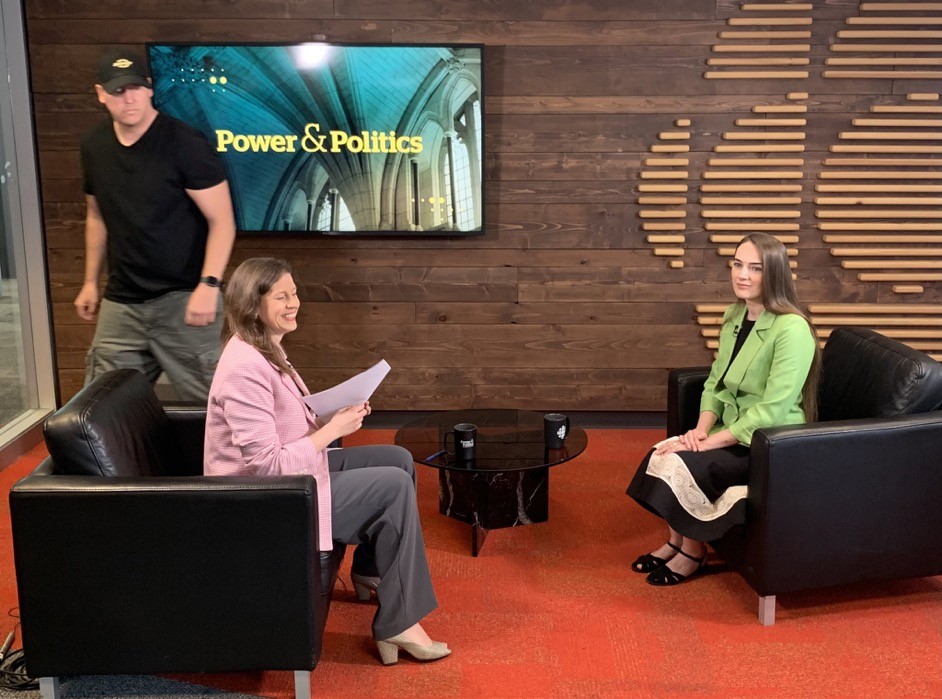
Then off to the airport to fly to Toronto where she just arrived in time for a gala fundraiser at the Old Mill in Etobicoke, where she gave another keynote address followed by a musical performance by international vocal sensation (and Ukrainian-Canadian from Winnipeg) Chantal Kreviazuk, who flew in from Los Angeles just to show her support for Oleksandra’s work. James Temerty, a generous supporter of Ukrainian projects, introduced Ms. Matviichuk to the stage. She privately presented the tour’s lead sponsor with a guelder rose (kalyna) to be planted on Canadian soil as a reminder of the suffering and resilience of Ukrainians in their ongoing struggle for freedom. Despite the somber message, the gala was a resounding success, and brought together the leadership of the Ukrainian diaspora in Canada’s largest metropolis, along with allies of Ukraine in its dark hour.
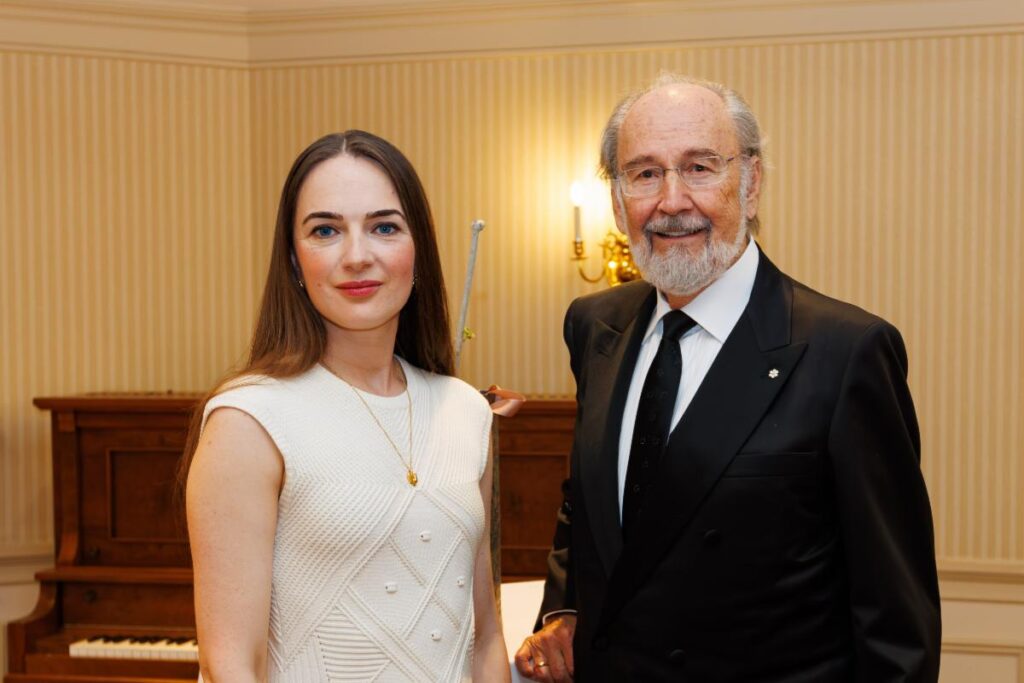
Photo credit: Andrey Syrko
Friday, June 7th opened with a breakfast with the financial leadership of Canada’s business community. Some 250 guests – mostly not from the Ukrainian community – came to hear Ms. Matviichuk’s message about Russian aggression and the need to prosecute war crimes. The event proved to be the single most successful fundraiser of the tour. She then met with newcomer children and parents at St. Demetrius Eastern Rite Catholic School in Toronto to talk about her work.
As word got out about Ms. Matviichuk’s tour, she was approached by representatives of an art gallery to visit a special pop-up Banksy exhibition which included photos of the mysterious dissident artist’s recent street art in Kyiv protesting Putin’s war of aggression. To Ms. Matviichuk’s surprise, the exhibit curator and numerous staff at the Lighthouse gallery spoke flawless Ukrainian.
The final event of the day was a guest lecture at the University of Toronto’s Munk School where students were able to ask her questions about her work and the ongoing war. The lecture was followed by a dinner in her honour hosted by the faculty, where special guest Deputy Prime Minister Chrystia Freeland joined in for the discussion. (But don’t tell anyone; she was supposed to be door-knocking for the St. Paul’s by-election that houses UofT!)
Saturday morning, Oleksandra flew to Winnipeg where she was beautifully greeted at the airport with a Ukrainian ornate bread – korovai – and salt. This is an ancient traditional greeting for honoured guests. She visited Oseredok for a guided tour by institution’s leadership team, who took her through the art gallery and the archives that have been preserving priceless Ukrainian artifacts for eighty years.
With just enough time to change for another gala, Ukraine’s Nobel Peace Prize laureate transfixed the audience with her appeal for ongoing help for Ukraine. In a moving moment of solidarity, Knowledge Keeper Buffalo Stone from the Dakota nation welcomed Ms. Matviichuk with two gifts: a ribbon skirt simultaneously representing the Indigenous children of residential schools, missing and murdered Indigenous women, and Ukraine’s stolen children, as well as a white eagle feather wrapped in blue/yellow ribbons – praying for peace in Ukraine.
Ms. Matviichuk was introduced by accomplished lawyer, judge and senator, Sen. A. Raynell Andreychuk, as well as MLA Mark Wasyliw who brought a greeting on behalf of the premier. Canadian chanteuse Chantal Kreviazuk again enchanted the room with her song in tribute to Ms. Matviichuk.
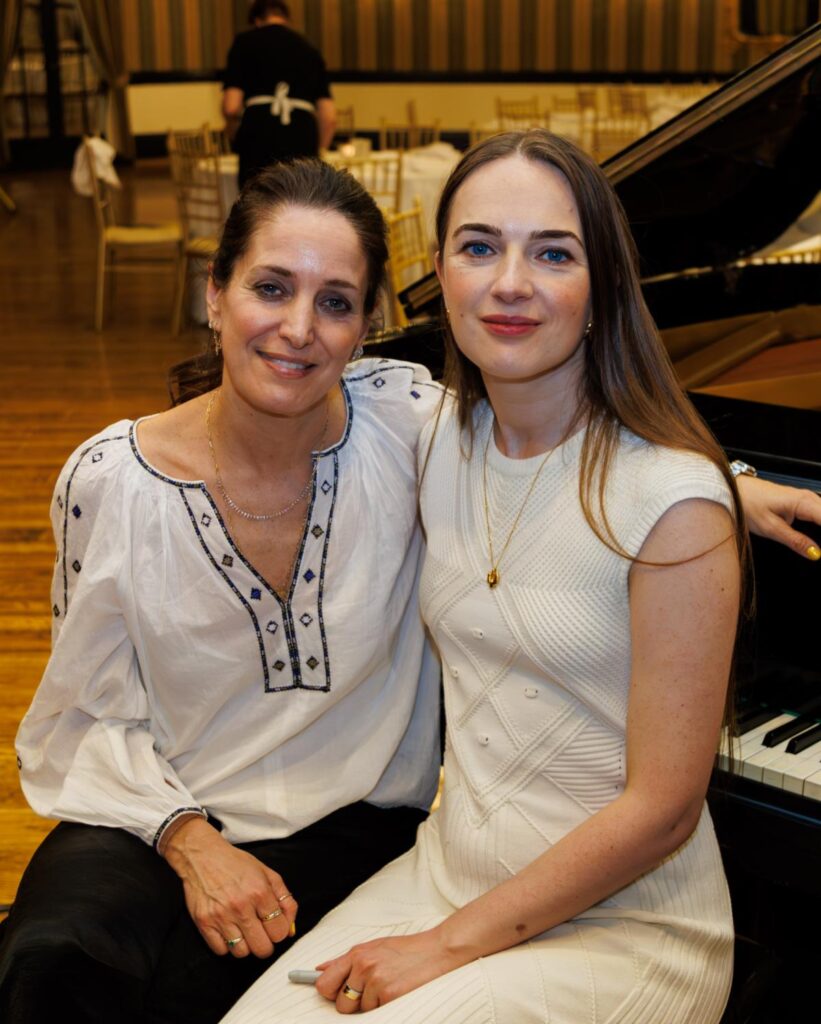
Photo credit: Andrey Syrko
On her final day in Canada, Sunday, June 9th, Ms. Matviichuk lay flowers at the Holodomor memorial outside of Winnipeg City Hall. She then visited the Canadian Museum for Human Rights for a guided tour by the museum’s leadership team. She concluded with a join press conference with CEO Isha Khan. Guests then proceeded to a screening of a documentary about Ukraine’s stolen children, while Ms. Matviichuk bade farewell to Canada and went to the airport to fly to a conference in Berlin.
Following her tour, Ms. Matviichuk said she is “sincerely grateful to the Foundation for this tour, which I can call the best of my life. Every minute of my stay in Canada was thoughtful and effective. It was a truly remarkable tour, a testament to the exceptional team that organized it. I will always remember it with gratitude for all your efforts!!!”
She also sent a video which CUF has posted on her behalf, with the following message to all Canadians: “Dear Canada, thank you for welcoming me so graciously over the last seven days. Thank you for listening to the important message that Ukraine is suffering. Daily. That innocent people are being slaughtered by Russia’s genocidal war. Ukraine needs your help. Please do not forget my people. We are fighting a war for freedom. It’s a war for civilization itself – on your behalf as well. Thank you to the Canada-Ukraine Foundation for making this trip possible, to be able to visit your beautiful country. Slava Ukraini!”

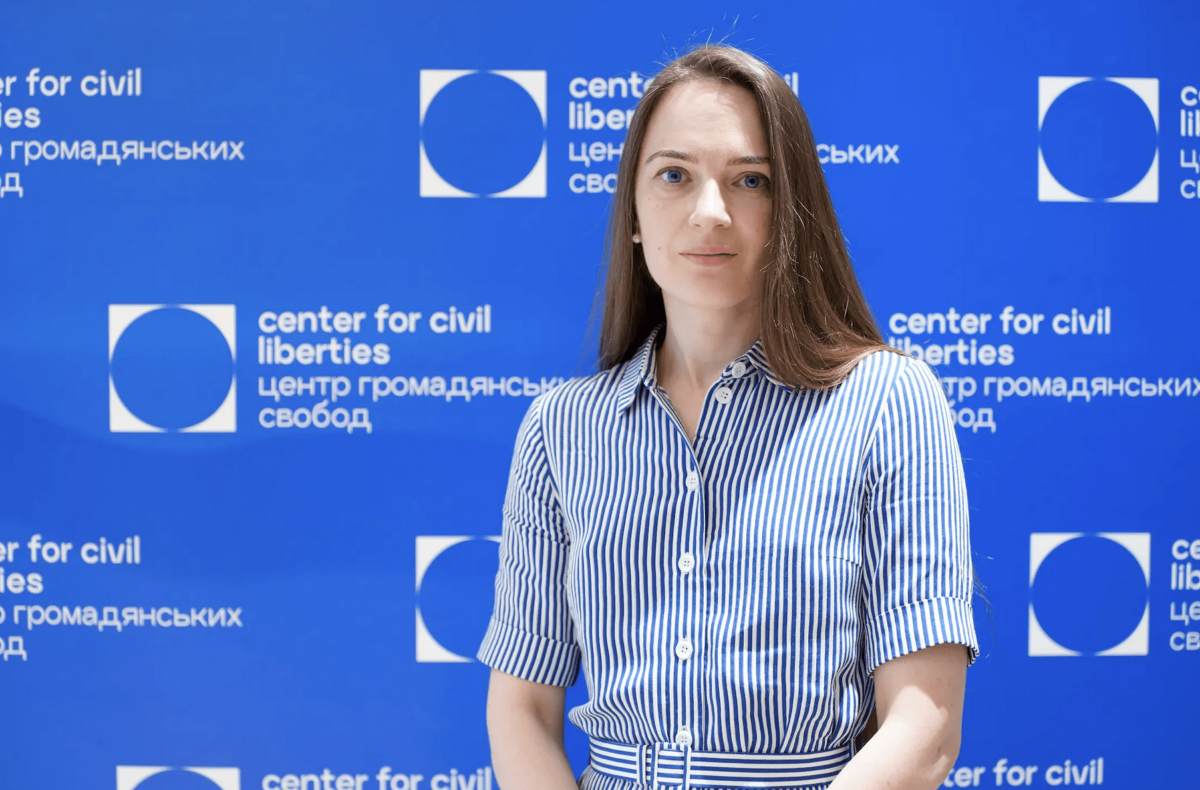
Ukrainian human rights lawyer and Nobel Peace laureate Oleksandra Matviichuk will be touring Canada from June 3 to June 9 as a guest of the Canada-Ukraine Foundation. Ms. Matviichuk will visit Ottawa, Montreal, Toronto and Winnipeg for more than 30 events, including meetings with senior officials in Ottawa and political and business leaders elsewhere. Here’s our Q&A with Oleksandra Matviichuk, by Canada-based Ukrianian journalist and Policy contributor Anastasiya Ringis.
By Anastasiya Ringis
May 31, 2024
Ukrainian civil society was hardly surprised when the Center for Civil Liberties and its founder, Oleksandra Matviichuk, received the Nobel Peace Prize in 2022. Instead, this award was perceived as a natural choice.
After all, Oleksandra and her organization defended the rights of Maidan activists during the Revolution of Dignity in 2013-2014 and fought for the release of dozens of prisoners of war from Russian captivity. One of her most famous cases was the release of Ukrainian filmmaker Oleg Sentsov, who spent five years in a Russian prison.
Today, the work of the Center focuses on documenting war crimes committed by Russians against the civilian population of Ukraine. Since the beginning of the war, the organization and its network of partners have reported more than 70,000 such cases.
Oleksandra’s work has been recognized with numerous awards; in person, she is modest and sensitive, ready to explain to everyone how human rights violations in one country can affect the global world order.
Here is our Policy Q&A:
Anastasiya Ringis: What do you think is important for Canadians to know about what is happening in Ukraine in terms of war crimes and human rights abuses being perpetrated by Russian forces?
Oleksandra Matviichuk: I’ve talked to hundreds of people who survived Russian captivity. They’ve told how they were beaten, raped, packed into wooden boxes, electrically shocked through their genitalia, and their fingers were cut, their nails were torn away, their knees were drilled, they were compelled to write with their own blood. One lady told me how her eye was dug out with a spoon. There is no legitimate reason for doing this. There is also no military necessity for it. Russians did these horrific things only because they could.
Unpunished evil grows. Russian military committed terrible crimes in Chechnya, Moldova, Georgia, Syria, Mali, Libya, other countries of the world. They have never been punished for it. They believe they can do whatever they want.
If Russia succeeds and we do not break this circle of impunity, it will encourage authoritarian leaders in various parts of the world to do the same. The international system of peace and security does not work anymore. Democratic governments will be forced to invest money not in education, health care, culture or business development, not in solving global problems such as climate change or social inequality, but in weapons. We will witness an increase in the number of nuclear states, the emergence of robotic armies and new weapons of mass destruction. If Russia succeeds and this scenario comes true, we will find ourselves in a world that will be dangerous for everyone without exception.
AR: The Government of Canada has co-launched and is co-chairing the International Coalition for the Return of Ukrainian Children. What is this issue of the “Stolen Children”?
OM: When we talk about the illegal deportation of Ukrainian children, we refer to at least four categories. The first category includes children who were deported together with their parents, and their fate depends on whether or not their parents found the resources and energy to leave Russia as quickly as possible.
The second category comprises children from state institutions, such as orphanages. We have no means to track their whereabouts or condition. The third category consists of children who were sent by their parents to camps in Russia during battles in their regions. When their cities and villages were liberated, the Russians refused to return these children.
And the fourth category includes children whose parents were arrested and detained in filtration camps or were killed by Russian forces. These children are being prepared for forcible adoption into Russian families despite having parents or relatives in Ukraine.
Ukrainian officials have identified almost 20,000 Ukrainian children who have been illegally deported to Russia, and so far, only 388 have been returned. While the war continues, we don’t have exact numbers on these cases.
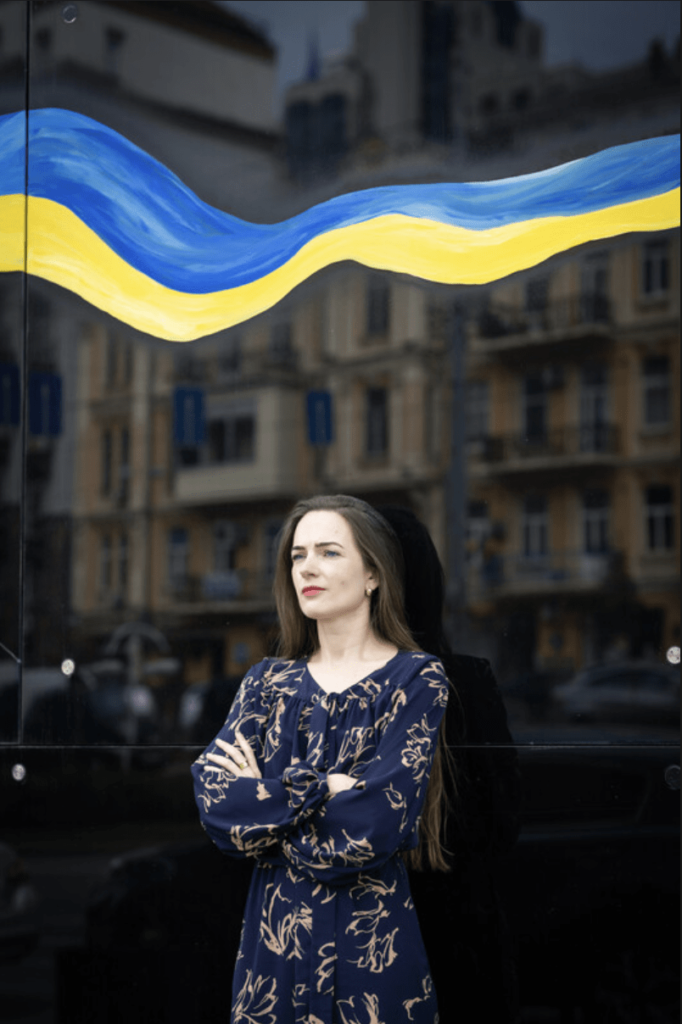
AR: That is very chilling. What is being done by your NGO and others to get them back?
OM: The main problem is that currently, there is no legal mechanism that the parents or relatives of the children or Ukraine — as the state of their origin — could apply to stop Russia from committing crimes against the children. Russia has not even complied with the provisional measures ordered by the International Court of Justice (ICJ), which in 2022 ordered the withdrawal of Russian forces from the territory of Ukraine. In the international architecture of peace and security, there is little that can be done with a nuclear state that is a permanent member of the UN Security Council with veto power.
For now, the law does not work. Although, I trust that it is temporary. That’s why we are now recording war crimes so that, sooner or later, all Russians who have committed these crimes, as well as Putin and the rest of the senior political leadership and military high command, can be brought to justice.
AR: What are the main challenges your team is facing in investigating war crimes overall? I understand you catalogued over 19,000 in the city of Bucha alone.
OM: We have faced an unprecedented number of war crimes. We united efforts with dozens of regional organizations and built a national network of documentators throughout the country. Working together, we have recorded more than 72,000 episodes of war crimes. It’s just the tip of the iceberg. Russia uses war crimes as a method of warfare. Russia tried to break people’s resistance in occupied territories by inflicting immense pain on the civilian population.
We are documenting more than just violations of the Geneva or Hague Conventions. We are documenting human pain.
We are facing the problem of the responsibility gap. The Ukrainian legal system is overloaded with the amount of war crimes proceedings. The International Criminal Court will limit its investigation to a few selected cases. And the question is who will provide the millions of people the chance for justice?
War turns people into numbers. The scale of war crimes grows so fast that it becomes impossible to tell all the stories. But people are not numbers. We must return people their names. We must ensure justice for all, regardless of who the victims are, their social position, the type and level of cruelty they’ve endured, and if the international organizations or media are interested in their case. Because the life of each person matters.
AR: Ultimately, is this going to The Hague? Because there have also been calls for a so-called” Special Tribunal”. What is the difference between these two models?
OM: The problem is that there is no international court that can prosecute Putin and his acolytes for the crime of aggression. Even the International Criminal Court has no jurisdiction over the crime of aggression in the situation of the Russian war against Ukraine. But all atrocities that we and other people in different parts of the globe document during the war, like war crimes, crimes against humanity, and genocide it’s the result of someone’s leadership decisions to start the war.
That’s why we must establish a special tribunal now and hold Putin, Lukashenko, and others responsible for the crime of aggression accountable.
AR: What is the message you are bringing to the Government of Canada?
OM: If we want to prevent wars in the future, we have to punish states and their leaders who start such wars in the present. But in the whole history of humankind, we have only one such precedent. And we still look at the world through the lens of the Nuremberg Trials, where Nazi war criminals were tried only after the Nazi regime had collapsed. But we are living in a new century. Justice should not depend on how and when the war ends. We cannot wait.
Politicians often have the temptation to avoid solving complex problems. But if left unresolved, these problems only become more acute. That’s why we need the voices of ordinary people worldwide calling for justice for Russian war crimes. It’s crucial not just for people in Ukraine. We need to prevent Russia’s next attack on other countries.
Russia must be held accountable. This includes not only criminal prosecution for international crimes but also the confiscation and transfer of over 300 billion frozen Russian state assets to Ukraine in Western countries.
AR: Can you tell us about your tour? What will you be doing in Canada overall?
OM: I plan to visit several cities and speak with different audiences. I want to thank people in Canada for their support during this dramatic time in our history. I also want to remind that Ukrainians are fighting not just for themselves, but for the international world order based on the UN Charter and international law, which was established after the Second World War. People in Ukraine are fighting for freedom that has no limitations on national borders. Only spread of freedom makes our world safer.
Anastasiya Ringis is a freelance journalist and communications consultant. Born in Crimea, she has been in self-exile since the Russian occupation in 2014. In 2016, she was formally banned from occupied Crimea, along with other Crimean activists and leaders.
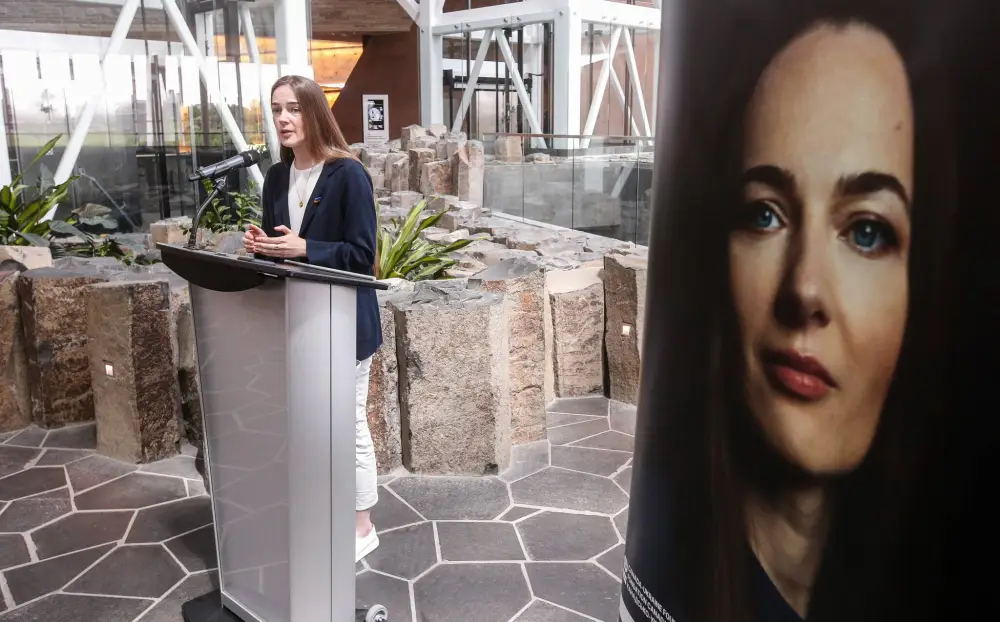
The head of a Nobel Peace Prize winning Ukrainian organization says she is thankful Canada is helping her country fight.
Oleksandra Matviichuk, head of the Center for Civil Liberties, which won the prestigious international award in 2022, for what the Nobel committee called its “outstanding effort to document war crimes, human right abuses and the abuse of power,” said the ongoing war isn’t just between Ukraine and Russia.
“This is not just a war between states,” Matviichuk said Sunday before a tour of the Canadian Museum for Human Rights in Winnipeg.
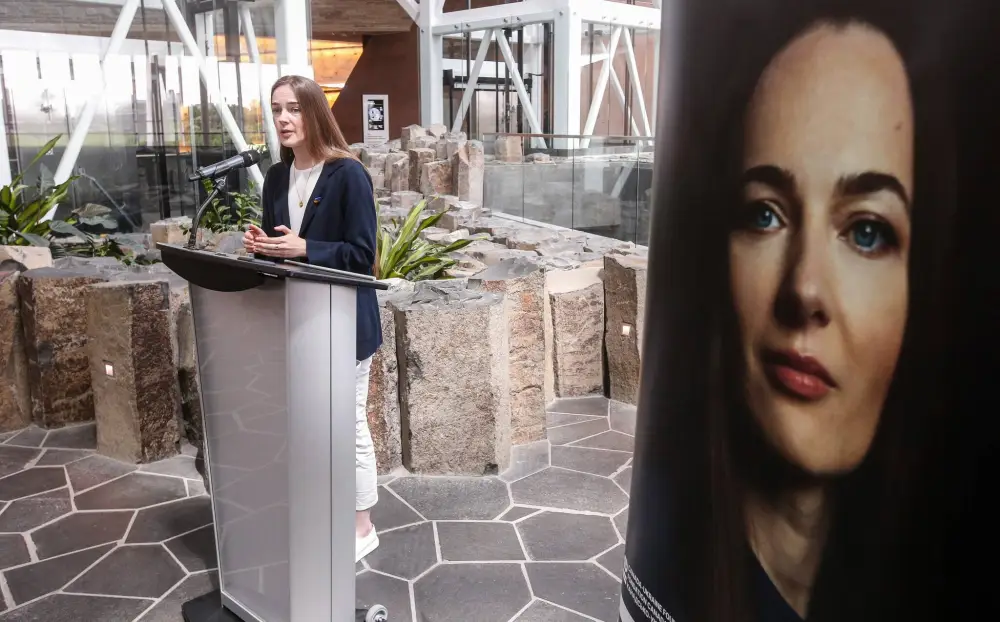
Nobel Peace Prize Laureate Oleksandra Matviichuk spoke at the Canadian Museum for Human Rights in Winnipeg on Sunday.
“This is a war between two systems: authoritarianism and democracy. With this war, (Russian President Vladimir) Putin attempts to convince the entire world that democracy, rule of law and human rights are fake values … If Putin succeeds, it will encourage other authoritarian leaders, in different parts of the world, to do the same.
“We can find ourselves in a world which will be dangerous for everyone, without any exception.”
The Center for Civil Liberties was founded in 2007 and began pushing authorities to make sure Ukraine became a full-fledged democracy that followed the rules of law.
After Russia unilaterally annexed the Crimean peninsula in 2014, it began to document cases of unlawful imprisonment of citizens and, since Russian forces crossed the Ukrainian border in 2022, it has documented war crimes by Russian soldiers against the civilian population.
Victor Hetmanczuk, chairman of the Canada-Ukraine Foundation, has said the organization’s work “cataloging war crimes is essential and will constitute a critical part of the Nuremburg trials against Kremlin officials once this war is over.”
Matviichuk said: “Russia has never been punished. Russia believes they can do whatever they want … We must hold Putin and top political leadership and high ministry (accountable).
“If we are not able to stop Putin in Ukraine, he will go further. Russia is an empire … empires always try to expand. And that is why, it is not just a question for Ukraine how to stop Putin, this is our common goal and we have to achieve this goal together.”
Since arriving in Canada on June 3, Matviichuk has given speeches and held private meetings in Ottawa, Montreal, Toronto and Winnipeg with politicians and senior government officials, including federal Justice Minister Arif Virani.
The speaking tour was to raise awareness of war crimes committed in Ukraine.
Matviichuk spoke at a fundraising gala in Winnipeg on Saturday, which included a musical performance by Chantal Kreviazuk, and took a tour of the Oseredok Ukrainian community hub and diaspora archive centre.
She laid flowers at the Holodomor monument Sunday.
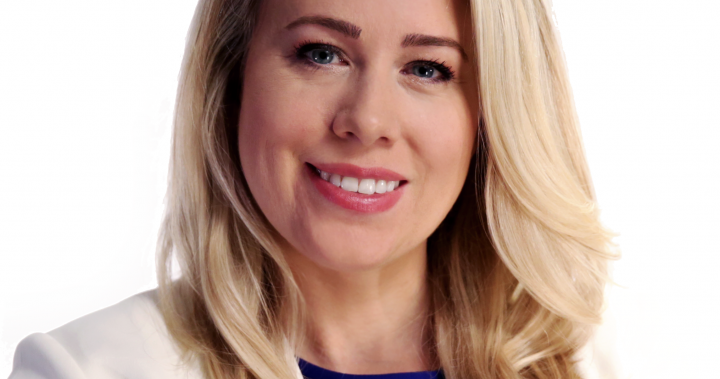
THE WEST BLOCK
Episode 39, Season 13
Sunday, June 9, 2024
Host: Mercedes Stephenson
Guests:
Garry Clement, Former RCMP Superintendent
Thomas Juneau, University of Ottawa
Oleksandra Matviichuk, Chair, Centre for Civil Liberties in Ukraine
Location:
Ottawa Studio
Mercedes Stephenson: It’s a massive security threat and it’s coming from inside the House of Commons.
I’m Mercedes Stephenson. The West Block starts now.
Frank Caputo, Conservative MP: “This places a cloud of suspicion over every single member of the House.”
Mercedes Stephenson: As a report reveals some unnamed parliamentarians knowingly helped foreign states meddle in Canadian politics, those members could still be sitting in the House and Senate, and they could still be working with hostile foreign governments. We dig into the conflicting reports on how it could be dealt with.
STORY CONTINUES BELOW ADVERTISEMENT
Prime Minister Justin Trudeau: “We’ve done just incredible work.”
Mercedes Stephenson: And we sit down with a compelling Nobel Peace Prize laureate who is fighting for the rights of kidnapped Ukrainian children.
It’s the latest report on foreign interference and it is by far the most explosive.
The 92-page document based on secret evidence and testimony raised serious concerns that some sitting parliamentarians have been knowingly colluding with foreign powers, including hostile ones. China and India are named as the two worst offenders. Among the allegations that some parliamentarians deliberately helped to influence Canadian politics in campaigns in the interests of foreign powers that some shared sensitive information that could help those foreign states and in some cases, shared material that would help foreign countries to pressure MPs to change their position in key issues. They’re also accused of accepting money and personal benefits in exchange for those activities.
The Liberals claim the RCMP will sort things out.
Chrystia Freeland, Minister of Finance and Deputy Prime Minister: “We have confidence in our law enforcement bodies to do their job.”
Dominic LeBlanc, Public Safety Minister: “The RCMP take their responsibilities extraordinarily seriously, have the resources necessary to investigate and should the RCMP, for example in their wisdom decide that charges should be laid in consultation with the appropriate prosecutors, that’s our system in a rule of law democracy.”
STORY CONTINUES BELOW ADVERTISEMENT
Mercedes Stephenson: Yet intelligence often cannot be used as evidence in criminal proceedings. In fact, Canada’s spy agency and our allies typically do not allow intelligence to be used in prosecutions. That’s because highly sensitive, secret information could be revealed in court, damaging sources and gathering techniques.
Garry Clement, Former RCMP Superintendent: “We take this extremely seriously, to make sure that we do not share information that will potentially harm Canadians.”
Mark Flynn, RCMP Deputy Commissioner: “Our hands are limited in what we can do. The work that we do behind closed doors is so important because there are a lot of steps that are taken to mitigate threats to reduce the harm, to increase public safety that will never see the light of day.”
Pierre Poilievre, Conservative Leader: “Who are they?”
Mercedes Stephenson: The Conservatives are demanding that the names of the accused parliamentarians be released.
Michael Cooper, Conservative MP: “The prime minister needs to release the names.”
Mercedes Stephenson: The NDP wants the political careers of those parliamentarians terminated.
Jagmeet Singh, NDP Leader: “I believe if there’s any evidence that someone knowingly worked with a foreign government to influence our democracy, they should no longer be a member of Parliament.”
STORY CONTINUES BELOW ADVERTISEMENT
Mercedes Stephenson: Joining me now to talk more about this are Garry Clement, former RCMP superintendent; and Thomas Juneau, former Middle East analyst with the Department of National Defence, who is now teaching at the University of Ottawa. Thank you very much both for joining us.
You have phenomenal expertise in the worlds of intelligence and policing, and of course, you’re both keyed into politics and it seems like those three worlds really collided in this report this week that stunned a lot of Canadians and stunned a lot of us who work on Parliament Hill, alleging that there are a number of parliamentarians, which by the way can be both MPs and senators, who have knowingly engaged in essentially domestic collaboration with a foreign country, potentially to the detriment of Canada. In at least one case they mentioned that it was injurious.
Thomas, if I can start with you. How serious do you think the allegations in the situations described in that report are, this week?
Thomas Juneau, University of Ottawa: Well the allegations are potentially very serious. First of all, it’s a step more in terms of details and information and gravity of potential accusations compared to what we knew so far, but it’s only a step.
The second element to mention is to always keep in mind that yes, allegations are serious. Yes, overall we know that there’s a serious problem and more needs to be done, but there’s a lot of uncertainty still as to the specific details of what is being alleged right now.
STORY CONTINUES BELOW ADVERTISEMENT
Mercedes Stephenson: Yeah, there’s tremendous uncertainty. We don’t know how many people. We don’t know who. We don’t know which parties. We don’t know how many are still sitting. We don’t know how many are MPs and how many are in the Senate and we’re not even getting a ballpark on this. But Garry, the government is sort of punting this to the RCMP and saying well, we have faith in the RCMP and in CSIS. I keep hearing from senior law enforcement that they may not have the laws on the books to prosecute this. Do you think it’s legitimate for the government to say well it’ll go to the RCMP? I mean, could we see charges? Could we see charges as serious as some analysts have been raising, like treason?
Garry Clement, Former RCMP Superintendent: You know, I hate to say it but this is, in my view, total deflection. The reality of it is, and I agree with the senior RCMP officers you spoke to, the laws are not there right now. We don’t have a foreign interference directory. To say it’s treason, I mean, you might be able to stretch it and look at some of them from a breach of trust point of view but that’s just reflecting what the real issue is. The real issue is we’ve got a systemic problem in the House of Commons, dealing with members of Parliament that are abusing our democracy and impacting our democracy. I think the public is underestimating what this threat really is and how serious it is. And we need our politicians, at least somebody there, to show some leadership and not put their head in the sand as they are today and say well, it’s the RCMP’s responsibility and we’ll continue as we have always.
STORY CONTINUES BELOW ADVERTISEMENT
Mercedes Stephenson: Thomas, how do political parties go about investigating this, that the Liberals have said that they will conduct an internal review? I’m not sure how if they can’t release the names, and there’s a very real proposition that people could be voting for some of these people in the next election. Should Parliament investigate this? How do you think this unfolds to try to figure out who is involved and hold those people accountable?
Thomas Juneau, University of Ottawa: There really is no easy or obvious or simple answer to that question, and I’m not saying that to deflect or avoid the question. We don’t have, and that’s part of the problem, a clear mechanism to deal with this at this point. As we just mentioned, current laws are not well adapted to this, so that may not be an avenue that can work, even when laws are well adapted, and in some cases there’s always an issue of converting intelligence into evidence, into criminal proceedings in court. That’s a big challenge that we face. And our political parties, a) have an incentive not to make this public. Have an incentive to deflect. Have an incentive not to directly address this and I think it probably goes to more than just political party. So what is the answer? I think the answer has got to be given the very imperfect situation we deal with, multiple options. The media has to continue pressuring. Civil society has to continue pressuring. Opposition parties have to continue pressuring. We have a variety of review and oversight bodies, some of which have published reports. Very recently, the National Security and Intelligence Review Agency, the National Security and Intelligence Committee of Parliamentarians. They have to continue to be—the whole commission on foreign interference has to continue being engaged. It’s not perfect. None of this is magical, but overall, you have to hope that these small steps will lead to progress.
STORY CONTINUES BELOW ADVERTISEMENT
Mercedes Stephenson: Garry, the Conservatives, who by the way were silent on this for close to over 24 hours, I think because they tried to figure out to your point Thomas, what it meant for their parties. There are always partisan interests. The Liberals have been deflecting. The NDP and the Bloc, ironically the party which wants to separate from Canada have probably been the most aggressive on this file, but the Conservatives have been calling for the names to be released and so have other opposition parties. The Liberals have said they can’t do that. It’s dangerous for a number of reasons. It would compromise intelligence. It could unfairly implicate people who there is no evidence of, there’s just intelligence on. What’s your view on whether the names should be released?
Garry Clement, Former RCMP Superintendent: I strongly believe they should be. And I guess what I’m going to say to that, Mercedes, you know, in my generation, my father, my uncles, further generations, grandparents, grandfathers, they fought in two world wars to have democracy in this country. And we’ve got now, a situation where we’ve got individuals that are supposed to be representing our interests in a democracy that are lining themselves with state actors that go against the very thing that our fathers and forefathers fought for. So my reaction to the Liberals nod is shame on you as politicians. Shame on you prime minister, you’ve got a lot to atone for. Let’s have some leadership and get this done.
Mercedes Stephenson: Thomas, do you agree with that?
STORY CONTINUES BELOW ADVERTISEMENT
Thomas Juneau, University of Ottawa: The lack of transparency here is casting a shadow on the system as a whole and that is damaging trust in institutions. Transparency is never a magic recipe that will resolve all of these trust issues but it can ultimately only help, even if it’s difficult. Even if politically it can be embarrassing. That being said, without defending the government here because I do think that they should be more transparent, it is difficult. There are privacy issues. There are classification issues. There are ongoing investigation issues that may, in some cases, and we don’t know that publicly justify not releasing names or at least not right now. And in other cases, you know, what’s been said is not necessarily inaccurate that in some cases there might be intelligence on possible relationships but that’s not proof. So do you—where’s the minimal bar to be transparent when you have suspicions but no proof where a wrong accusations could seriously damage not just a career but you know, the overall life of an individual. So yes, transparency, but it is complicated.
Mercedes Stephenson: We’ve seen the report. It’s public, but of course, none of us have seen the raw intelligence products that the members of Parliament on this committee have been able to see.
Pierre Poilievre has said that he wants to see this information. He wants to see the names, but he has refused to be background checked to receive a security clearance. This is something the Liberals jump on all the time as a partisan point saying well what does he have to hide? I’ve spoken to some experts who say he doesn’t need a security clearance because the prime minister doesn’t get one. Others don’t get one. Certain elected members of Parliament are considered privy councillors. They can have access if the government determines. Others say no, there is one standard in order to see classified, raw information, you have to have undergone a security clearance. I’m curious to know what both of you think of that, starting with you, Garry.
STORY CONTINUES BELOW ADVERTISEMENT
Garry Clement, Former RCMP Superintendent: To believe that anybody that’s going to see sensitive intelligence, it should be mandatory they get a security clearance. And I honestly don’t understand why they’d be against it unless they’ve got something to hide. The bottom line, it’s the only way we’re going to protect security.
Mercedes Stephenson: Thomas?
Thomas Juneau, University of Ottawa: I don’t know why the leader of the Opposition does not want a security clearance but I think he absolutely should get one. If we want to be collectively, not just him, serious about addressing what is a serious problem, security clearances are absolutely necessary.
Mercedes Stephenson: We just have a few seconds left, but I’d ask each of you what the biggest thing you think the government needs to do going forward is to protect Canada against this kind of foreign interference by members of Parliament.
Garry Clement, Former RCMP Superintendent: Just in very short, we have a real situation in this country. It’s not a small issue and I think it’s time that we accept that we have a huge issue. It’s affecting our reputation internationally and we really have to take this by the horn and deal with it and be open and transparent.
Mercedes Stephenson: Thomas, last word to you.
Thomas Juneau, University of Ottawa: I would say very quickly, first pass Bill C-70, which is being considered right now. It’s a first step. It’s not enough, but it’s a good first step. And two, we need a much more serious national security culture in Parliament, in the public service, in the media, in civil society, in academic, to understand and deal with these issues much more seriously.
STORY CONTINUES BELOW ADVERTISEMENT
Mercedes Stephenson: Thank you both so much for your time, your knowledge, your expertise. I’m sure we’ll be talking to you again soon.
Thomas Juneau, University of Ottawa: Thank you.
Garry Clement, Former RCMP Superintendent: Thank you very much.
Mercedes Stephenson: Up next, Russia’s campaign to ethnically cleanse Ukrainian children, and the Nobel Peace Prize laureate who’s fighting against it.
Mercedes Stephenson: Nobel Peace Prize Laureate and human rights lawyer Olesksandra Matviichuck has dedicated her life to helping the people of Ukraine. She’s been documenting war crimes in her home country for the past 10 years, ever since Russia’s occupation of Crimea.
In the past two years alone, she’s helped to document more than 7,200 cases of war crimes. But one of the projects she’s the most passionate about is helping the children of war in Ukraine. And she is meeting with leaders abroad around the world to help garner support for that cause.
STORY CONTINUES BELOW ADVERTISEMENT
Prime Minister Justin Trudeau “For just things that will work fighting for accountability in the horrific Russian invasion in Ukraine but also more specifically nearer to my heart, fighting for the children that have been taken away from their families, from their homes, from their language, from their culture, and are too often forgotten of conflicts like these.”
Mercedes Stephenson: I sat down with Oleksandra Matviichuk last week.
Oleksandra, welcome to The West Block and thank you so much for sitting down to share the stories of Ukrainians with our viewers.
Oleksandra Matviichuk, Chair, Centre for Civil Liberties in Ukraine: Thank you for this opportunity.
Mercedes Stephenson: You have a tremendously difficult job. You are documenting the crimes against humanity and the war crimes that the Russians are carrying out in Ukraine. Can you tell us some of what you are seeing day to day still? Because I think many Canadians are familiar with what happened at the start of the war but they may not realize it’s still going on.
Oleksandra Matviichuk, Chair, Centre for Civil Liberties in Ukraine: We document every day how Russian troops are deliberating shelling residential buildings, schools, churches, museums and hospitals. How they are attacking recreation corridors. How they’re torturing people in filtration camps. How they’re forcibly taking Ukrainian children to Russia. How they’re banning Ukrainian language and culture. How they’re abducting, robbing, raping, and killing civilians in the occupied territories. So to be clear, we are documenting not just violations of Geneva and Health conventions. We are documenting human pain.
STORY CONTINUES BELOW ADVERTISEMENT
Mercedes Stephenson: Much of that pain is being felt by families as Ukrainian children are being taken by Russians to be indoctrinated.
Piotr Hofmanski, Former President, International Criminal Court: “It is forbidden by international law for occupied powers to transfer civilians from the territory they live in to other territories. Children enjoy special protection under the Geneva Convention.”
Mercedes Stephenson: The International Criminal Court issued arrest warrants for Russian President Vladimir Putin and his commissioner for children’s’ rights, for the war crime of unlawful deportation of children and that of unlawful transfer of children from occupied areas of Ukraine to the Russian Federation.
Oleksandra Matviichuk, Chair, Centre for Civil Liberties in Ukraine: When we have even this arrest warrant of International Criminal Court, even this arrest warrant provides them a legal obstacle because authoritarian leaders can afford themselves to shake Putin’s hand, but not democratic leaders can do it—I mean to shake hand[s] with [an] officially recognized person as the biggest child kidnapper in the world.
Mercedes Stephenson: It’s factually accurate but so many don’t think of him along those lines. What has happened to Ukrainian children? We know that many were taken to Russia, but my understanding is as we were doing research for this, it is very systemic and a very sophisticated effort with a very large number of Ukrainian children.
STORY CONTINUES BELOW ADVERTISEMENT
Oleksandra Matviichuk, Chair, Centre for Civil Liberties in Ukraine: Yes, it’s a widespread action and this is deliberate policy how to [00:03:48] with Ukrainian nation because this illegal deportation of Ukrainian children to Russia is a part of the genocidal policy which Russia imposed against Ukraine. Ukrainian children in Russia, they are told they are not Ukrainian children. They are Russian children. They are put in Russian re-education camps where they have to sing Russian national song and to learn a Russian poet and to say that Russia is their mother land. And then they are prepared for a forcible adoption in Russian families where they will be [brought] up as Russians.
Mercedes Stephenson: The Ukrainian government says it’s happening to nearly 20 thousand Ukrainians, some as young as four months of age. They’re being taken from their hometowns across the border to at least 43 camps spread from one end of Russia to another. The primary objective: to strip them of any form of Ukrainian heritage and replace that with Russian culture, patriotism, and military education.
Russians separated this father from his kids. He was sent to a labour camp. The children held in a different city.
[00:04:59 Child speaking]: Translation.
STORY CONTINUES BELOW ADVERTISEMENT
Mercedes Stephenson: It’s a form of ethnic cleansing to take children from their parents, to wipe them of their history, to essentially brainwash them to believe that they’re someone else, that they’re a Russian instead of a Ukrainian. That they belong to a different family is so hard to even imagine in this day and age we heard never again for so long after what happened to Nazi Germany and the re-education camps there or the Stalinist camps, the re-education camps there. How do the children react to this situation because I know you’re hearing their stories?
Oleksandra Matviichuk, Chair, Centre for Civil Liberties in Ukraine: So this is a story which was told [to] me by my friend. She was [a] journalist and she’s originally from [00:05:57], which is now under Russian occupation. And Russians came to her native school. They burn out books of Ukrainian history and Ukrainian language, and substituted with Russian books. And now each day in the school is starting with singing Russian national song. But one child didn’t think and they teacher once started to ask him why you are not singing with others? And the child responded, “I don’t know the words.” “What’s the problem”, said teacher. “Go home and learn it by heart.” The next day when this child returned, [the] teacher deliberately put him alone in the front of the whole class and ordered the child to sing Russian national song. And instead of Russian national song, this child started to sing Ukrainian national song. And why it’s [an] emotional story for me personally [is] because it showed that when [a] child in occupation has strength and courage to resist, we as adults have no luxury to get tired.
Mercedes Stephenson: Oleksandra, can you describe what it’s like when some of these children who have been rescued and brought back are reunited with their families?
Oleksandra Matviichuk, Chair, Centre for Civil Liberties in Ukraine: I can tell you the story of [00:07:27 Yevhen Mezhevyi?]. He has three children. He was separated because he didn’t pass filtration. And he spent one month in captivity. And I will agree on the frame, the cruel treatment which was faced in their captivity, but then when he was released, he came to Russia and he managed to stop the process of forcible abduction of his three children.
STORY CONTINUES BELOW ADVERTISEMENT
Mercedes Stephenson: The family now reunited. An inspiration for so many as they remember why Ukraine and the war there matters. Oleksandra, thank you so much for joining us.
Oleksandra Matviichuk, Chair, Centre for Civil Liberties in Ukraine: Thank you very much.
Mercedes Stephenson: Coming up, the double standard between journalists and parliamentarians when it comes to national security.
Mercedes Stephenson: Now for one last thing…
Allegations that Canadian politicians have been colluding with foreign states to influence and even share information that’s harmful to Canada shocked the country last week. Journalists need to press for answers. Who? What? When? Why? And what does it all mean?
Given that, I thought it would be worth pulling back the curtain a little bit on some of the challenges that journalists contend with on national security reporting, namely something called the Security of Information Act (SOIA). It can be used to charge reporters and to threaten our sources.
STORY CONTINUES BELOW ADVERTISEMENT
Introduced after 9/11, SOIA as it’s better known, was designed to stop espionage and foreign threats, but it also looms large over journalists. Reporting classified documents or information, even if it is in the public interest, could land reporters in jail.
I’ve had national security sources warn me about discussions they’ve witnessed when angry senior officials wondered if my reporting might contain information that police could arrest me over.
Even outside of the Act, there’s a culture of weak source protection in Canada and intimidation. Military police have hounded and grilled people they believe are my sources.
National security investigations have been launched, including over who leaked the information to me that China was harassing Canadian Air Force crews over the Pacific, and a crown attorney once threatened to designate me as a federal material witness at trial to obtain my notes, phone recordings, and force the disclosure of a confidential source.
It all creates an interesting double standard when we hear that the laws in the books may not be enough to prosecute parliamentarians who engaged in deeply unethical behaviour.
That’s our show for today, and we’ll see you here next Sunday.
